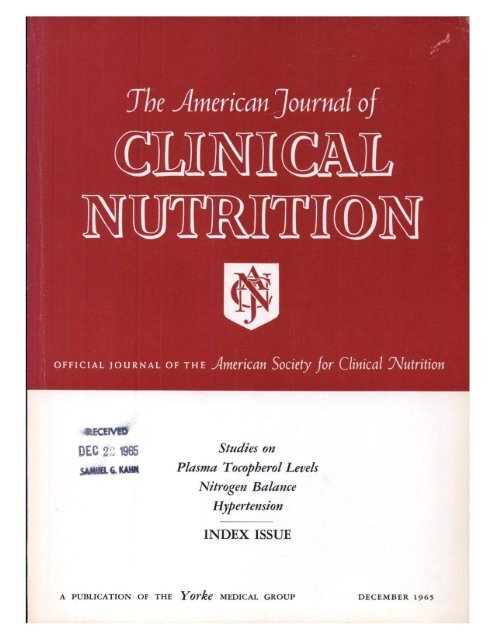米糠提取物缓解成人抑郁症状的疗效:一项随机、双盲、安慰剂对照试验
IF 6.5
1区 医学
Q1 NUTRITION & DIETETICS
引用次数: 0
摘要
背景:临床前研究表明,米糠提取物补充剂(RBS)在改善抑郁样行为和症状方面具有潜在的益处。目的:我们旨在评估为期8周的RBS在缓解轻度至中度症状严重程度的成人抑郁症状方面的有效性和安全性。方法:这项随机、双盲、安慰剂对照试验包括100名成人(年龄19-75岁),韩国版汉密尔顿抑郁评定量表(K-HDRS)得分为7-24分。参与者被随机分配接受1 g/天的RBS或安慰剂,持续8周。基线和8周后的评估包括使用K-HDRS、韩国版贝克抑郁量表- ii (K-BDI-II)、患者健康问卷-9 (K-PHQ-9)、贝克焦虑量表(K-BAI)和其他心理量表进行情绪评估。生物标志物测量包括血清脑源性神经营养因子、血清素、多巴胺和唾液皮质醇。结果:在RBS组和安慰剂组中,分别有47和50名参与者完成了干预。在8周时,与安慰剂组相比,RBS组在K-HDRS评分方面表现出更大的下降(p结论:RBS可能对成人轻度至中度严重程度的抑郁症状有有益作用。该试验在clinicaltrials.gov注册为NCT05180136。https://clinicaltrials.gov/study/NCT05180136。本文章由计算机程序翻译,如有差异,请以英文原文为准。
Efficacy of rice bran extract for alleviating depressive symptoms in adults: a randomized, double-blind, placebo-controlled trial
Background
Preclinical research indicates the potential benefit of rice bran extract supplements (RBS) in improving depressive-like behaviors and symptoms.
Objectives
We aimed to evaluate the efficacy and safety of an 8-wk administration of RBS in alleviating depressive symptoms among adults with mild-to-moderate symptom severity.
Methods
This randomized, double-blind, placebo-controlled trial included 100 adults (aged 19–75 y) with scores of 7–24 on the Korean version of the Hamilton Depression Rating Scale (K-HDRS). Participants were randomly assigned to receive 1 g/d of RBS or a placebo for 8 wk. Evaluations at baseline and after 8 wk included mood assessments using K-HDRS, the Korean version of the Beck Depression Inventory-II, the Patient Health Questionnaire-9 (K-PHQ-9), the Beck Anxiety Inventory (K-BAI), and other psychological scales. Biomarker measurements included serum brain-derived neurotrophic factor, serotonin, dopamine, and salivary cortisol.
Results
In the RBS and placebo groups, 47 and 50 participants, respectively, completed the intervention. At 8 wk, the RBS group exhibited greater reductions in K-HDRS scores compared with the placebo group (P < 0.001), with adjusted differences of −5.73 [95% confidence interval (CI): –7.07, –4.39; intention-to treat analysis (ITT)] and −5.95 [95% CI: –7.33, –4.57, per-protocol analysis (PP)], corresponding to percent changes of −45.1% (ITT) and −46.0% (PP), respectively. A trend toward greater reductions in the percent changes of K-BDI-II and K-BAI scores was observed in the RBS group compared with the placebo group (ITT and PP). Notably, K-PHQ-9 scores were lower in the RBS group than in the placebo group (P = 0.026, PP) after 8 wk of treatment. However, no significant intergroup differences were identified in other questionnaire scores or biomarker measurements. No adverse events were reported.
Conclusions
RBS may provide a beneficial effect on depressive symptoms of mild-to-moderate severity in adults.
Trial registration number
This study was registered in clinicaltrials.gov with registration number NCT05180136 (https://clinicaltrials.gov/study/NCT05180136).
求助全文
通过发布文献求助,成功后即可免费获取论文全文。
去求助
来源期刊
CiteScore
12.40
自引率
4.20%
发文量
332
审稿时长
38 days
期刊介绍:
American Journal of Clinical Nutrition is recognized as the most highly rated peer-reviewed, primary research journal in nutrition and dietetics.It focuses on publishing the latest research on various topics in nutrition, including but not limited to obesity, vitamins and minerals, nutrition and disease, and energy metabolism.
Purpose:
The purpose of AJCN is to:
Publish original research studies relevant to human and clinical nutrition.
Consider well-controlled clinical studies describing scientific mechanisms, efficacy, and safety of dietary interventions in the context of disease prevention or health benefits.
Encourage public health and epidemiologic studies relevant to human nutrition.
Promote innovative investigations of nutritional questions employing epigenetic, genomic, proteomic, and metabolomic approaches.
Include solicited editorials, book reviews, solicited or unsolicited review articles, invited controversy position papers, and letters to the Editor related to prior AJCN articles.
Peer Review Process:
All submitted material with scientific content undergoes peer review by the Editors or their designees before acceptance for publication.

 求助内容:
求助内容: 应助结果提醒方式:
应助结果提醒方式:


